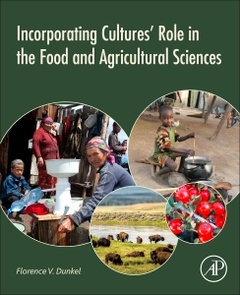Description
Incorporating Cultures' Role in the Food and Agricultural Sciences
Author: Dunkel Florence V.
Language: English
Subjects for Incorporating Cultures' Role in the Food and...:
Keywords
AGSC 465R; Affordable greenhouses; African; Agricultural-based projects; Agriculture; Amino acids; Amiskapii Pikuni; And ecosystems; Apsaalooke; Art design; Bambara; Bambara culture; Basic tools; BioRegions; Bison; Bruchid beetle; Cameroon; Cave Junction; Chapul; Chicken award; Chief Dull Knife College; Chinese Cultural Revolution; Chokecherry pudding; Cognitive dissonance; Commodity foods; Communication patterns; Communications between Indigenous people; Community; Community action; Community problems; Comprehensively; Connection to land; Corn; Course linkages; Cow hoof stew; Cowpea; Cross-cultural immersion; Cultural filter; Cultural wealth; Culture; Culture-based; Culture-smart agriculture; Culture-smart research higher education; Darhad Valley; Decolonization; Decolonizing methodologies; Deer tongue; Desired quality of life; Dewatering of rivers; Diet; Dry meat; Early childhood nutrition; Eastern Shoshone; Edible entrails; Edible insects; Empathy; Environmental footprint; Equity; Ethno-centric world view; Ethno-relative world view; Ethnobotany; Ethnocentric world view; Ethnorelative thinking; Ethnorelative world view; Expansive Collaborative Model; Farmers; Food; Food choices; Food insects; Food quality laboratory; Food security; Food sovereignty; Food storage; Foreign students; Fry bread; Gap; Ger school; Global College; Global collaboration of students; Herd management; Higher Education; Holistic Management; Holistic process; Holistic teaching methods; Hope; Hull House; Humanities; Hypothesis testing; Immersion; Inclusively internationalized; Inclusively internationalizing higher education; Indigenous; Indigenous community; Indigenous holism; Indigenous knowledge; Indigenous research; Indigenous values; Insects; Interconnectedness; Intercultural development
Support: Print on demand
Description
/li>Contents
/li>Biography
/li>Comment
/li>
Incorporating Cultures' Role in the Food and Agricultural Sciences addresses the practical needs of the professors, administrators and students who often face challenges of working together with Indigenous peoples with whom they have no prior experience. Missed communication, failed projects and unrealistic goals are daily realities. Academia and industry often encounter frustration in recruiting and retaining Native American students and other ethnicities.
This text is a guide for anyone working in the food or agriculture disciplines or industries, particularly for those working with people of a culture different from one?s own. Comprehensive, full awareness of one?s own culture is a prerequisite for effective teaching and learning within another culture. This book is replete with stories, examples and peer-refereed journal articles to help build awareness. These stories, examples and articles from multiple voices are placed over a basic underlying framework that is summed up in the title of the book itself.
Introduction. Grand Challenges and the Millennial Generation
Part 1. Fundamentals of the Culture and Agriculture Relationship1. Quiet Revolution: Where did you come from? 2. Decolonization and the Holistic Process3. Immersion4. Failures
Part II. Listening In and Between Communities5. Listening Horizontally: Kenya, Mali, Malaria, Kwashiorkor6. Listening Horizontally: The Northern Cheyenne and the Apsaalooke7. Listening Horizontally: Bioregions and Peace Engineering8. Listening Between Communities and Policy Makers: Montana, Mali, and Mongolia Middle Schools Listen together with USDA NIFA and University Students9. Listening with students
Part III. Bridging the gap between Food and Agricultural Sciences and the Humanities10. Two cultures: Humanities and Plant, Animal, Food Science11. Couples Counseling: Native Science and Western Science12. Putting it together, comprehensively, inclusively
- Provides compelling, well-referenced practical ways to understand the cultural component of behavior related to food and agriculture
- Explores behavior in setting policy, developing curricula, interacting with communities and in making choices as a consumer
- Connects the dots between food deserts, the disgust factor and the world’s grand challenges
- Includes lessons learned and new approaches in food and agricultural sciences using transdisciplinary, experiential action research methods
- Contains practical, state-of-the-art methodologies and diagrams to get started improving intercultural competency, inclusivity and internationalization of food and agricultural sciences




